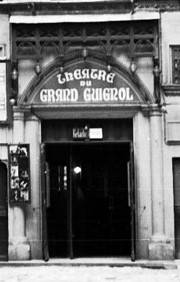|
Home
|
Jul 13, 2021
This week’s themeWords coined after buildings and venues This week’s words tammany Grand Guignol chamber of horrors bastille Hawthorne effect 
Le Théâtre du Grand-Guignol, Paris
Photo: Carl Guderian
A.Word.A.Day
with Anu GargGrand Guignol
PRONUNCIATION:
MEANING:
noun: An event, entertainment, etc., of a sensational or horrific nature. adjective: Gruesome, grotesque, or horrifying. ETYMOLOGY:
From Le Grand Guignol (literally, The Great Puppet), a theater in Paris
that specialized in such entertainment. Earliest documented use: 1905.
NOTES:
Le Théâtre du Grand-Guignol started in 1897 in a former chapel in
Paris. Its specialty was gruesome and gore. A typical evening featured
a series of short plays. It’s said that the theater measured the success
of a play by how many in the audience fainted. As a marketing gimmick,
the theater management hired doctors to be in attendance. The theater
closed its doors in 1962. Charles Nonon, its director at the time, said:
“We could never compete with Buchenwald. Before the war, everyone
believed that what happened on stage was purely imaginary; now we know
that these things -- and worse -- are possible.”
USAGE:
“The contemplation of suicide, blatant racism, and a family of ‘trapped’,
emotionally stunted snobs: nobody expected Meghan Markle and Prince Harry’s
interview with Oprah Winfrey to be as dramatic as it was, or as grim. ...
One bombshell and within-palace-walls horror story followed another, one
numbing thud after another. ... This Grand Guignol was just getting started.” Tim Teeman; Meghan Markle and Prince Harry’s Oprah Interview Was a Royal Family Depth Charge; The Daily Beast (New York); Mar 8, 2021. See more usage examples of Grand Guignol in Vocabulary.com’s dictionary. A THOUGHT FOR TODAY:
If life had a second edition, how I would correct the proofs. -John Clare,
poet (13 Jul 1793-1864)
|
|
Subscriber Services
Awards | Stats | Links | Privacy Policy
Contribute | Advertise
Awards | Stats | Links | Privacy Policy
Contribute | Advertise
© 1994-2025 Wordsmith